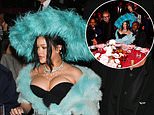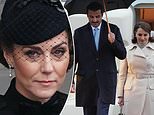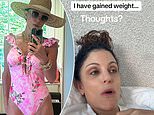Why I owe my new career to my nine-year-old son: David Baddiel on writing a novel for his children
'I wish to discuss the awful category of celebrity writer. It’s bad enough being classed as a celebrity novelist. But there’s a special sneeriness reserved for the celebrity children’s novelist,' said David Baddiel
One thing that’s a bit complicated, if you’re a celebrity, is writing a children’s book.
Not as complicated, obviously, as referring to yourself in print as a celebrity.
Especially if you’re a celebrity who spends more time writing and directing these days than he does on screen.
But, for the purposes of this piece, let’s overlook that, because I wish to discuss the awful category of celebrity writer. It’s bad enough being classed as a celebrity novelist.
But there’s a special sneeriness reserved for the celebrity children’s novelist. It’s seen, by some cynics, as the most straightforward cash-in of one’s celebrity chips: or at least, ties for first place in the chart with starting your own line of perfume.
It began, I think, 25 years ago with Sarah Ferguson and her seminal work Budgie: The Little Helicopter. Which I should stress I haven’t read.
This is the problem. Budgie may be a classic up there with Roald Dahl, but it’s a reflex to assume that in fact it was something knocked up quickly to cash in on whatever moment Fergie was having, in between having her toes sucked, in 1989.
Because a kids’ book is shorter and ostensibly easier to write than an adult novel, a lot of people think that it’s just possible that Geri Halliwell’s Ugenia Lavender or Gloria Estefan’s Noelle The Bulldog have been written by the authors solely to part parents with the pounds in their pockets. (Assuming they were written by the authors, of course.)
Prejudice against the idea of writing for kids also comes from writers: the ones who write for grown-ups, that is.
I was at the Costa Book Award when it wasn’t given to JK Rowling for Harry Potter, but instead to Seamus Heaney for his translation of Beowulf – a fabulous example, mainly, of how much middlebrow judges tend to choose winners who make themselves look highbrow, but also, part of a general literary snobbery towards children’s books.
Martin Amis said famously that to write children’s books he’d have to have had a brain injury.
Therefore: it’s possible that by deciding to write a children’s book, I now run the risk of being thought of as someone with the intelligence of Geri Halliwell after a brain injury.
Nonetheless I’ve written one. It’s called The Parent Agency. It’s about a child, called Barry, who is cross, in the usual kid way, with his parents.
They don’t buy him enough stuff; they’re boring; they’re tired all the time; they’re too strict; and they favouritise his twin sisters.

The Parent Agency: 'It’s about a child, called Barry, who... wishes, one night, for better parents, and then goes into a parallel universe, run by kids, where indeed children get to choose their parents,' said David
So he wishes, one night, for better parents, and then goes into a parallel universe, run by kids, where indeed children get to choose their parents.
Barry gets to try out five different sets of parents, as part of the Parent Agency’s Five Parent Trial Package.
He chooses rich parents; famous parents; incredibly fit and healthy parents; parents who will let him do whatever he likes; and parents in which he’ll be the favourite one in the family…
So let’s explain, at least, how I came to this terrible career choice. As a writer of four novels for adults, I hadn’t been expecting to write a children’s book. But then, a couple of years ago, I went with my family to the opening of the Harry Potter Leavesden Studios tour.
We were just going in, and Ezra, my son, then seven, said to me: ‘Dad? Why doesn’t Harry run away from the Dursleys and go and find some better parents?’ I said: ‘I don’t know Ez. But that’s an interesting idea.’
I’m someone who doesn’t stop to think much about what kind of writer he is. In my opinion, being a writer means you can write anything.
It’s the idea, not your self-image, that should dictate the form. I knew this idea – born in a child’s head, suggesting all sorts of fantastical possibilities, but presented in that brilliant matter-of-fact way about the magical that children have – could only be a children’s book.
Also, psychologically, I think one of the things comedians have which makes them comedians is that they are perhaps more able than most to stay in tune with – without wishing to sound too Disney – the child within themselves.
Which is a poncey way of saying that being a comedian allows you to get paid, essentially, for being childish: ergo History Today, the sketch which myself and Rob Newman used to do in the prehistoric era now known as the Nineties, where two old professors insulted each other like schoolkids.
So when I came to write a children’s book, I’m not sure I applied that different an approach to writing comedy in general: listening carefully to whether the lines are making the nine-year-old, alive and well within my head, laugh.
That nine-year-old has been made louder and more vibrant by actual nine-year-olds, such as Ezra, in my daily life.
Which of course is probably the key reason for the existence of The Parent Agency.
Because I am not a dad from the Seventies, and spend therefore a fair bit of time with my children – trying to understand as best I can how they think, how they absorb the world – that has changed my own way of thinking.
I am primarily, really, a storyteller, and one thing about having kids is it gives you a lot of practice in that department.
I’ve been reading and making up stories for my children for 13 years now: that leads to a lot of fertile ideas for children’s tales, and how to excite and hook them in narratively has become clearer to me as a result.
Also, they’ve helped write it. Not only did Ezra, now 9, spark off the original idea, but also he and his older sister Dolly, just 13, have been the primary testing audience for the book. I’ve read it out to them all through the work-in-progress.
And I’ve very much listened to their advice, which has been both unfailingly good and presented without worrying too much about my feelings.
It’s a fantastic thing, as a writer, to have your primary audience there in front of you while writing. So if you’re looking for an answer to the question why – with all the cynics ready to sneer – write a children’s book.
It would have to be, in the end, because I have children.
Now read this exclusive extract from The Parent Agency
Imagine a world where parents don’t just have children. Instead, children are allowed to choose their parents...

Barry’s attention was distracted by The Head taking out, from under his desk, a gold laptop.
‘So...’ said The Head. ‘Let’s begin by having a quick look at the profiles...’
He opened the lid. He pressed a button, and then turned the laptop round so Barry could see the screen. On it, a series of pages, a bit like Facebook ones, were flicking past in a slide show. ‘These are the parent profiles,’ said The Head. ‘Every prospective parent has to create one of these and send them in…’
Barry could see, as the pages went by, photographs of grown-ups, smiling, normally outside their houses. Some of them in front of trampolines, or swimming pools, or big collections of toys. Others, in front of tables laden with delicious looking food.
‘Each one includes a short filmed message too…’
The Head clicked on a box on one of the pages. A couple in their front garden who had been still suddenly started moving. ‘Hello, I’m Sheila,’ said the woman. ‘And I’m Michael!’ said the man, who was holding a guitar. ‘And this is our song about us!’ ‘And hopefully...’ said the woman, pointing at camera, ‘You…’ Strum strum strum, went Michael’s guitar. ‘We are the Radcliffes,’ they sang, cheerfully, ‘And we never have any bad tiffs! We like to go to parks and zoos/And our house…’ At this point, they turned and gestured backwards towards their front door ‘…has seven loos!’
The Head clicked pause. ‘I don’t like them much,’ said Barry.
‘No,’ said The Head. ‘They seem a bit weird. But you get the idea.’ The slide show carried on, each new page showing a new set of parents. ‘That’s just a few of the couples on our books,’ said The Head. ‘There’s many more. Perhaps if you’d like to tell us what kind of parents you’d like to have, then we can begin matching you to five of these...’
He looked at Barry, expectantly.
‘Uh…?’ said Barry.
‘Shoot,’ said The Head.
‘Shoot what?’ said Barry.
‘Say what sort of parents you’d like. In an ideal world. Which this is.’
‘Oh right…’ Barry took out from his pocket the list of things that he blamed his parents for. The first thing that caught his eye was No 8, the one he always felt a bit guilty about writing: Being Poor. He realised with a rush that this was a big problem, perhaps the biggest, with his parents.
‘Rich,’ he said. ‘That’s what I’d like to start with. I’d like to have rich parents.’
The Head leant back in his chair, smiled, and said, ‘We’ll see what we can do...’
‘The Parent Agency’ by David Baddiel is published on October 9 by Harper Collins Children’s Books, priced £12.99.
To order your copy at the special price of £11.50, order at mailbookshop.co.uk before Oct 12; p&p is free for a limited time only.







































































































































































































